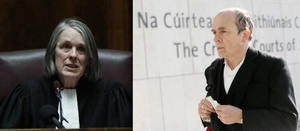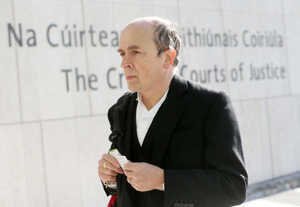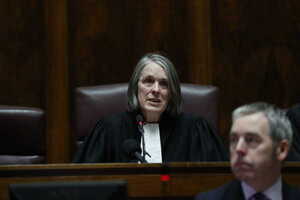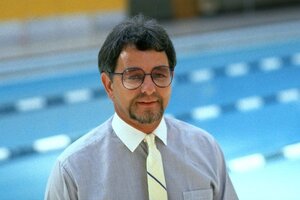Images from retired Chief Justice Susan Denham’s report into Mr Justice Seamus Woulfe’s attendance at an Oireachtas golf outing and dinner in August, showing how two suites were separated by a retractable, partition wall at the Station House Hotel in Clifden, Co Galway
This evening.
Retired Chief Justice Susan Denham’s report into Mr Justice Seamus Woulfe’s attendance at an Oireachtas golf outing in August has been published.
Mr Justice Woulfe told the retired judge that he sat at table 5 in the Omey Suite and sat with his back to the partition wall. He said he did not notice there was a second suite behind the wall.
From the report:
Mr Justice Woulfe stated that during the dinner he was not aware of, and had no reason to believe that, the event consisted of any diners other than those he could see in his dining room. He said he was not conscious of another room of diners in the hotel or any other room connected to the Oireachtas Golf Society.
All of the people whom he associated with the Oireachtas Golf Society event appeared to him to be in the same room with him. He could not hear any noise coming from any adjoining room. Nor was he conscious of any adjoining room. He was sitting facing the front of the room where the top table was and from where the speeches were made.
Elsewhere:
“The engineer was instructed that the dinner was followed by speeches and a prize giving; that a mobile audio speaker system had been installed in the Kylemore Suite for guests to hear the speeches, and to facilitate the adjustment of volume of the speaker a section of the retractable wall was opened at the time of the speeches and prize giving, which resulted in a narrow opening in the wall between the suites at that stage.”
Elsewhere:
At the end of the dinner there were speeches and a prize giving. During the prize giving at least one person, who was called on to receive a prize, approached the front of the room in the Omey Suite from Mr Justice Woulfe’s left.
Mr Justice Woulfe [who was in the Omey Suite] stated that this did not give him any cause for concern. After the event, and during the process of this review, Mr Justice Woulfe acknowledged that this person may have been dining in a second room, behind the retractable partition wall. It appears that late in the evening a gap was opened by the hotel staff in the retractable wall behind Mr. Justice Woulfe, slightly behind his left shoulder – see Image 30 in the Book of Images.
Mr Justice Woulfe stated that he did not know a gap had been opened, at the end of the dinner for the speeches and prize giving. He did notice Gerry Brady going up for a prize, from his left. But he indicated to the Reviewer [Ms Justice Denham] that he never noticed the open section in the partition wall.
Elsewhere:
Mr Justice Woulfe stated that after his appointment as a judge of the Supreme Court he was not familiar with internal judicial protocols. He had received briefing materials from the Courts Service, but these concerned logistical issues, such as car parking and office space.
Mr Justice Woulfe, after discussing the matter with his wife, decided that, the safest thing to do was to raise the issue of the Oireachtas Golf Society event with the Chief Justice.
On Wednesday 29th July, 2020 Mr Justice Woulfe was crossing the yard at the Four Courts and met the Chief Justice. Mr Justice Woulfe called out to the Chief Justice, saying that because he was new he just wanted to check something with him. He said that he had been invited to the Oireachtas Golf Society outing.
Mr Justice Woulfe emphasised that it was a non-political event. Mr Justice Woulfe recollects the Chief Justice said something like “I don’t see any problem with that”. Mr Justice Woulfe pointed out to the Reviewer [Ms Justice Denham], in fairness to the Chief Justice, that he did not raise the issue as to whether there would be a dinner or not.
At no time did Mr Justice Woulfe receive a formal written invitation to the Oireachtas Golf Society outing, which he understands may have had a reference to a dinner. He never had sight of such an invitation. He was not aware whether there would be a formal group dinner, or whether participants would dine separately in the clubhouse with their playing partners directly after their round of golf. So he could not have raised the issue of the dinner with the Chief Justice at that time because he, Mr Justice Woulfe, did not know of the arrangements.
He had one or two conversations with Paul Coghlan, and got the exact dates for the event. He stated that nobody mentioned the dinner one way or another in any of the conversations.
Elsewhere:
On arrival at the clubhouse in Ballyconneely he went upstairs to the bar, where he expected to register. At the registration desk he met Donie Cassidy and Deputy Noel Grealish. Paul Coghlan was also in the vicinity of the registration desk. Mr Justice Woulfe was asked for and paid a fee for the outing, and he was told that the fee included dinner.
He was given a docket or voucher for dinner and was told that the dinner would be in the Station House Hotel, Clifden at 9.00pm. This was when Mr. Justice Woulfe first became aware of the proposed dinner.
Mr Justice Woulfe did not consider phoning the Chief Justice, or any other member of the Court, to seek guidance in relation to the dinner. Mr Justice Woulfe conveyed that his assumption was that the Chief Justice would have known that there was some kind of social element to the golf. He considered that there was no need to go checking the details
with him. He believed that there was nothing inherently dangerous about the fact that there was going to be a dinner. He stated that gatherings of 50 people were allowed under the regulations. These were the regulations in which he had been involved in the Attorney General’s office.
Elsewhere:
At the meeting on the 8th September, 2020, having heard from Mr. Justice Woulfe that he first learnt of the dinner when he registered at the Ballyconneely Clubhouse, the Reviewer asked him;
Mrs Justice Denham: “Did you consider phoning the Chief, or any other member of the Court to seek guidance in relation to the dinner?”
Mr Justice Woulfe: “Ah, no. I think that would have been ridiculous, with respect, Judge, I really do. You know, I don’t think an adult person on holidays in that kind of sense would go bothering the Chief Justice at that stage. Particularly there was nothing to spark off bother in my mind that there was any question going back to him.”
Having, inter alia, pointed to the reassurances he, Mr Justice Woulfe, had received from experienced people in the hotel trade, and the Government policy and the economic imperative of hotels getting business, the Reviewer asked Mr Justice Woulfe what the position was for a judge.
Mrs Justice Denham: “And what about as a judge?
Mr Justice Woulfe: “Same as a judge. In this sense you’re an ordinary citizen going to a social and recreational event”
Mrs Justice Denham: “Well are you an ordinary citizen? … ”
Mr Justice Woulfe: “Because of the nature of the event I think you are.”
Later the Reviewer asked Mr Justice Woulfe;
Mrs Justice Denham: “Do you accept that your presence at the dinner may have created a public controversy which could have adversely affected the Supreme Court?”
Mr Justice Woulfe: “Ok that’s a difficult question. In one sense I suppose that is so, that for the media to also have the chance to bring down a judge as an extra fuel to the fire and it did add to the controversy that I was there. …”
Mrs Justice Denham: “I think so, do you accept the context and the context is the pandemic, where we have six months of not going to christenings, not holding weddings, not being able to go to your family’s funerals”.
Mr Justice Woulfe: “Of course.”
Mrs Justice Denham: “And pent up tension in the country?”
Mr Justice Woulfe: “Of course. This was a very unfortunate set of circumstances and unfortunate timing. And for those people to be presented by the media with what appeared to be a flagrant breach of the Regulations and the Guidelines was like letting off a bomb.”
In all the circumstances the Reviewer is of the opinion that there was cogent evidence that, apart from considering whether the dinner was in compliance with the covide-19 [sic] Regulations and Guidelines and the separation of powers issue, Mr Justice Woulfe did not seek advice on or consider whether it was appropriate for a member of the Supreme Court to attend the dinner.
Elsewhere
Mr Justice Woulfe stated that on Thursday morning, 20th August, 2020, he was absolutely dumbfounded to hear that Minister Calleary had resigned on account of attending the dinner.
Mr Justice Woulfe stated that he had not been aware of any breaches of the Regulations or Guidelines at that stage. He stated that he had racked his brain to see if there was something he had missed and stated that it had seemed to him that the media were pressing that there was a new Government rule on the 19th August and that the number had gone from 50 to 6 persons (at a gathering).
He stated that he was astonished, amazed, but he stated that if he had had time to think clearly he would have known that that could not have happened so swiftly. He stated that his understanding now (8th September, 2020) was that there had been wholesale confusion in the public’s understanding of the Regulations which applied on the 19th August, 2020.
The report can be read in full here
Earlier:
Retired Chief Justice Susan Denham has cleared Supreme Court Justice Seamus Woulfe for attending the event at the centre of Golfgate. As Attorney General, Justice Woulfe had signed off the restrictions he would later breach
This afternoon.
Via Orla O’Donnell at RTÉ:
It’s understood the report by Ms Justice Susan Denham found there were not sufficient grounds to warrant the resignation of Mr Justice Woulfe.
She also concluded that while he erred in deciding to attend the dinner, mitigating factors needed to be taken into account.
Ms Justice Denham found it was reasonable for the judge to rely on the assurances of the organisers and his own observations in relation to the compliance with Covid-19 regulations.
Good times.
Resignation of Woulfe over golf dinner would be ‘disproportionate’ (RTÉ)
Previously: Seamus Woulfe on Broadsheet
Meanwhile…
They laugh at Us.
Six Coalition senators who attended the infamous #Golfgate dinner have been appointed to Oireachtas committees – despite being stripped of their respective party whips just six weeks ago.#HowIrelandWorks https://t.co/F8Ft8QRgn6
— Mick Caul 😷 (@caulmick) October 1, 2020











